 A few months ago, a friend and I were having one of our many hundreds of random conversations when we started to talk about the differences in the commercialization of the two major Christian holidays: Christmas and Easter. We started really getting invested it this question and what factors lead to Christmas become the juggernaut that it currently is.
A few months ago, a friend and I were having one of our many hundreds of random conversations when we started to talk about the differences in the commercialization of the two major Christian holidays: Christmas and Easter. We started really getting invested it this question and what factors lead to Christmas become the juggernaut that it currently is.
Both holidays are given official status. Christmas is a designated federal holiday due to it being permanently celebrated in the Western Christian community on December 25th. Whereas Easter shifts due to seasonal and lunar changes but is always celebrated on a Sunday, meaning it did not need to be given a designated status as Sundays are recognized by the State as a non-work day. Schools across the globe used to call it Christmas and Easter breaks. In the last 10 years, all schools have adopted the politically correct terms of Winter and Spring Breaks. Yet, they still function around the religious observances.
Christmas, it seems comes more and more early in shops. Decorations, candy, gifts, and marketing can be seen as early as September. Christmas music can start to play on radio stations and coffee houses as soon as early November.
The Christmas music industry has truly excelled. Each new year, sees a new artist releasing an album of their versions of ‘classic’ Yule time songs. Even artists who have released albums years earlier will find their CDs flying off the shelf year after year come November 15 or so. And every occasionally, you will hear a song dedicated to Hanukah but from November until January 6 give or take a few days, the airways are filled with holiday music, the bulk of which is NOT generic wintery, non-religious tunes.
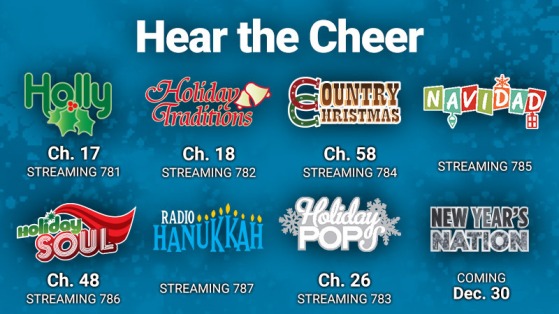
Yet when Spring comes around, the Lenten season descends and no Easter songs fill the airways, no songs of the soul preparing during the Lenten season, no songs talking about the life and death of Jesus, or the Passover celebration. Shoot, not even a song about the pagan Easter Bunny can be heard. The stores will have decorations and aisles for Easter candy- they will even have a small corner to Passover but not compared to the space devoted for Easter. Heaven forbid stores not capitalize on a holiday – religious or secular.
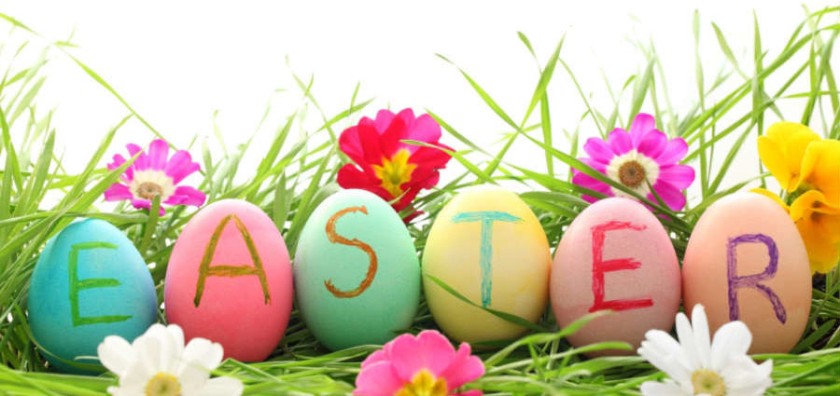
But what happened to make Christmas the dominant holiday? What made it socially and secularly acceptable to celebrate on such a large scale? Is it because of the marketing strategy of Coca Cola in introducing a secular version of St. Nicholas as Santa Clause that opened the door? Was it because of literature popularizing traditions and the spirit of the winter season that rooted itself with the Christian celebration of Jesus’s birth? Does it have to do with the time of season?
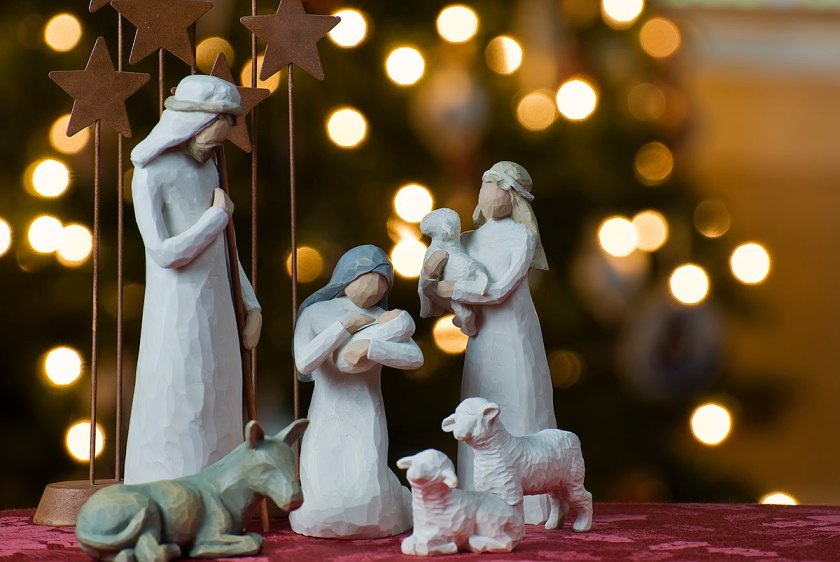
And yes, both Christmas and Easter have incorporated pagan festival and worship elements. It wasn’t until 700 years after Jesus died, that Christians started to celebrate the holiday of “Christmas” (that resembles a shadow of how Christians celebrate it today) as well as the fact that Pope Julius I declared December 25th (in 345 CE) as the designated day. Christmas didn’t become an American federal holiday until 1870 which piggybacked upon the growing traditions illustrated in Charles Dicken’s most famous tome, A Christmas Carol.
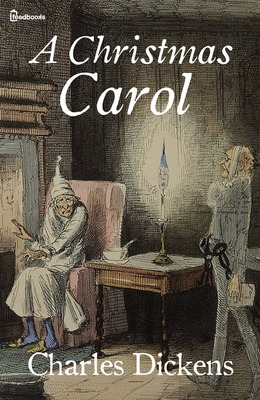
200 years earlier, Easter had already become rooted into the Christian lexicon. Easter became a celebrated Christian holiday after Emperor Hadrian crushed the Bar Kokhba revolt in 132 CE. So, it was Easter that was the first official Christian recognized holiday. Many Christians across denominations will agree that it is Easter that is the most important Christian holiday. The importance and celebration shouldn’t be on the fact that Jesus was born but that He died for people’s sins, that he became the “Pascal Lamb.” (fulfilling the Old Testament tradition found in the Passover celebration). And I wonder if it is this reason that Easter has not gained the traction that Christmas has had globally.
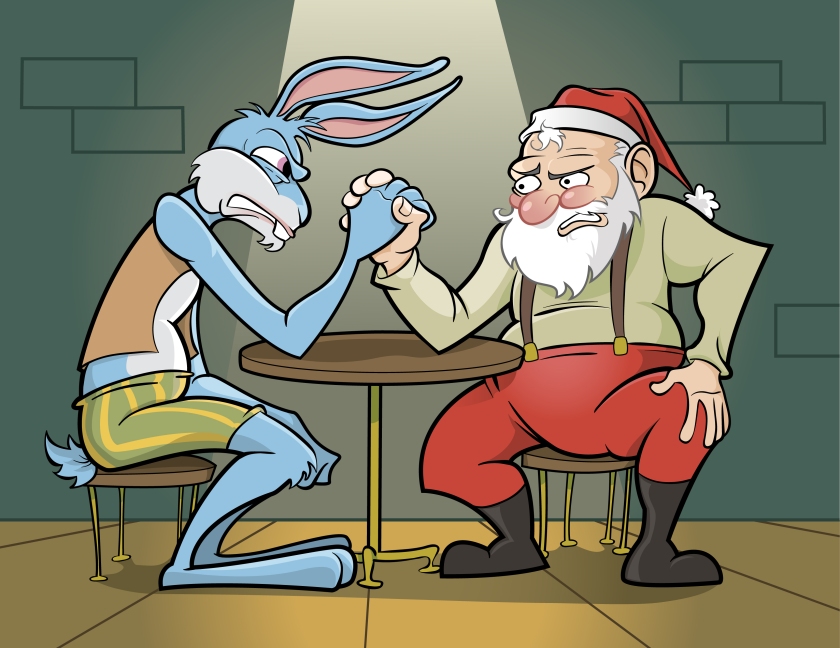
Christmas, the “Holiday Season,’ the Winter Solstice carries a lot. There are a lot of ways that one can talk about Christmas without talking about the Christian roots. There are countless movies out there that talk about the “Christmas spirit” centered on love, family, honesty – nothing to do with Mary giving birth in a manager. I even wrote a FAR post a while back about the plethora of Christmas movies out there as well as the films which have focused on Easter. Yet, the movies and music that come out during the Easter season are more focused on Spring – nothing in resemblances to Easter. Stores have banked on the images of the Easter Bunny and of Spring but other industries have not been as successful. No radio station, not dedicated to playing Christian music will be as driven as they are for Christmas music. Hallmark Channel will have two whole months from November and December and one in July that are solely focused on Holiday movies. Their marketing strategy come Easter is “Spring Renewal,” not one Easter inspired film to be seen.
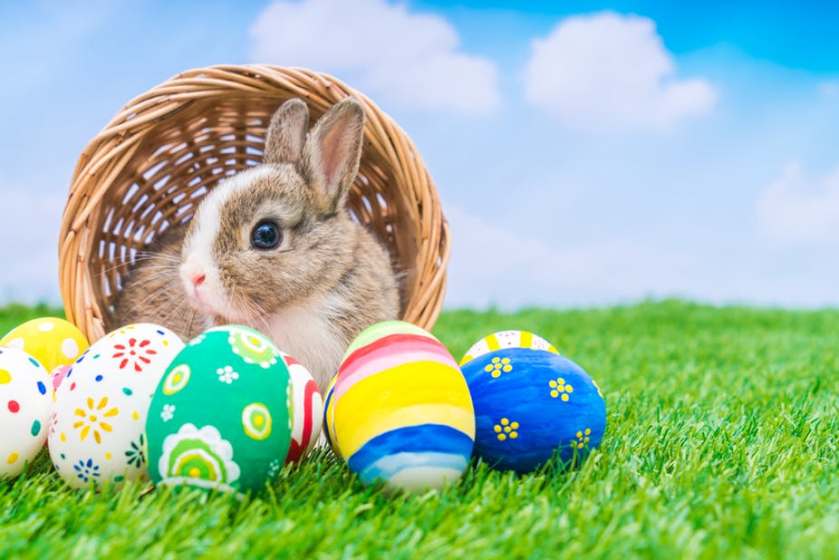
I challenge you to try and find a public, generic song that talks about Easter – a song that isn’t a Church hymn or about Spring. I would be colored surprised if there is one in existence. Yet I know at least 10 different songs that are not originally Church songs, that are based around the celebration of Jesus’s birth that are on the regular radio rotation. Something to think about as Easter is right around the corner.
Anjeanette LeBoeuf is a Ph.D Candidate in Women Studies in Religion at Claremont Graduate University. She is the Queer Advocate for the Western Region of the American Academy of Religion. She is currently a Lecturer of Asian Religions at Whittier College. She is a Wabash Teaching Fellow for Claremont McKenna College. Anjeanette also writes the for activist blog, Engaged Gaze. Her focuses are divided between South Asian religions and religion and popular culture. She has become focused on exploring the representations of women in all forms of popular culture and how religion plays into them. She is an avid supporter of both soccer and hockey. She is also a television and movie buff which probably takes way too much of her time, but she enjoys every minute of it. Anjeanette has had a love affair with books from a very young age and always finds time in her demanding academic career to crack open a new book.


Interesting post.
In the Greek Orthodox tradition Easter is the major holiday, followed by Aug 15 the Assumption of Mary. Holidays in Greece were not commercialized until the 1980s and afterwards.Christmas is becoming more important than it was, but still not as important as the other two holidays. Like Passover, Easter is celebrated with family and friends. A lot of food is purchased and cooked. The celebration is meant to be out of doors so it is not about how fancy a table you can set. Now the godparents have to buy a candle for their godchildren decorated with toys, such as Barbie dolls. This year I am seeing US style ceramic bunnies in windows and commercialization will no doubt continue.
LikeLiked by 1 person
Here comes Peter Cottontail, Hoppin’ down the bunny trail, Hippety Hoppety, Easter’s on it’s way, Gene Autry, only remembered because of my age. And mostly agree that Lent/ Easter seems more a time of great reflection rather than wild abandonment, tho’ fertility of spring was pretty wild in pagan times I would guess; someone asked me if Ash Wed could clash with Valentine’s Day and I think every culture marks the seasons and we get around to all the archetypes of a whole life eventually whatever our adopted path, Celtic Year, Medicine Wheel, Christian calendar, Jewish celebrations, rooted in place and meaning. Thanks for bringing this up, it’s a complex contemporary culture and this site keeps a thread that is important to me.
LikeLiked by 2 people
That song immediately sprang to my mind, too.
LikeLike
And mine.
LikeLike
I remember Easter songs. Irving Berlin’s “Easter Parade,” from the Fred Astaire-Judy Garland movie of the same name. Yes, and Peter Cottontail. Two songs, compared to the jillions of Christmas carols. When I was a child, we always got a new outfit for Easter to wear to church and show off. Maybe it’s Lent that discourages marketing this holiday that marks a rebirth.
LikeLiked by 2 people
I hope the god of commercialism dies in a sea of plastic before it kills the Earth, and sucks the meaning out of living with any depth and dignity.
LikeLiked by 2 people
Interesting question. My thought is that it might have to do with the fact that Christmas celebrates a birth, which is pretty universally considered joyful. The Easter season focuses on a death, which is generally considered taboo in Western culture, and then on a re-birth, which is also not part of general Western thought. While a happy family surrounded by animals might be generic, I can’t think of a symbol for Easter (as separate from spring) that does not involve a cross. And there is a very different feel to the period leading up to each holiday in the Christian calendar – contrast Advent with Lent.
LikeLiked by 4 people
This question has always fascinated me. Here in Canada we actually do have Easter Monday and Good Friday off as statutory holidays (I think it varies slightly by province) even though they do move around on the Gregorian calendar. But the distinction in each holiday’s marketing and permeation of overall culture is indeed stark! No question of Easter Starbucks cups (thank goodness), and whereas Christmas is sometimes argued to have been largely secularized, it’s hard to say the same about Easter.
It’s certainly true that Christianity’s dominance in North American culture is a large part of the reason why Christmas is so intensely popular, but I doubt it can be the whole reason since Easter is much more theologically and religiously significant to most Christians, yet has not even come close to permeating the culture in the same way. It’s certainly an interesting subject and I imagine there are a multitude of reasons for it. It may be more difficult to capitalize on Easter partially because Easter is not much of a gift-giving holiday, aside from chocolate. Maybe people feel more of a psychological need for a big celebration in midwinter than in spring. As mentioned above, the Easter season marks Jesus’ resurrection and a crucifixion which I think are more controversial subjects than Jesus’ birth. I’ve also read that it was down to the Victorians -and especially A Christmas Carol by Dickens- that really upped Christmas’ prevalence over Easter.
LikeLiked by 1 person
The so called pagan rabbit was an ancient symbol for re birth. So for me anyway, rabbits/hares carry depth and meaning.
LikeLiked by 2 people
I would argue Easter is absolutely marketable because chocolate eggs dominate the shops. However removed they are from Christian symbolism they still have as I understand christian elements of scapegoating and sacrifice. Battery chickens still occupy industrial farming the last time I checked (sacrificed for human excess), and the obsession with chocolate has to do with christians fasting because of lent and 40 days in the desert (sacrifice of self care for sadomasochistic patriarchy). I think bunnies have much to do with the Christian message to fill the world with children, thus breed as much as possible (sacrifice of self worth in order to create a competitive economy). IMO people should boycott these religious and economic festivals. I believe we have more worthy causes to serve our money in, such as animal rights, quality childhoods and the celebration of abundance at spring.
LikeLiked by 1 person
P.S. The weatherman on ABC in Los Angeles puts little symbols of holidays on his weekly forecast charts. Always Christian or secular holidays (like the Fourth of July). During what Christians call Holy Week, I notice that what he’s got are a rocking Easter egg and a hopping bunny. Does this make Easter more commercial?
LikeLike